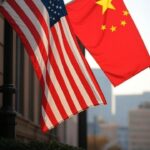Energy News Beat
Authored by Simon Elmer via Off-Guardian.org,
‘The technologies at the heart of the Fourth Industrial Revolution are connected in many ways — in the way they extend digital capabilities; in the way they scale, emerge and embed themselves in our lives; in their combinatorial power; and in their potential to concentrate privilege and challenge existing governance systems.’
– Klaus Schwab, Shaping the Future of the Fourth Industrial Revolution, 2018
The Wikipedia entry for the Great Reset, the first part of which is quoted in a blue panel as a corrective to any mention or discussion of this term on YouTube, reads as follows:
The Great Reset Initiative is an economic recovery plan drawn up by the World Economic Forum (WEF) in response to the COVID-19 pandemic. The project was launched in June 2020, with a video featuring the then Prince of Wales Charles released to mark its launch. The initiative’s stated aim is to facilitate rebuilding from the global COVID-19 crisis in a way that prioritizes sustainable development.
The initiative triggered a range of diverse conspiracy theories spread by American far-right and conservative commentators on social media such as Facebook and Twitter. Such theories include that the COVID-19 pandemic was created by a secret group in order to seize control of the global economy, that lockdown restrictions were deliberately designed to induce economic meltdown, or that a global elite was attempting to abolish private property while using COVID-19 to enslave humanity with vaccines.
I am not an American, have never belonged to any far-right organisation, my views are not conservative with either a big or a little ‘c’, and I have published a number of articles arguing against the conspiracy theory of history; but I have also argued that a virus with the infection fatality rate of seasonal influenza never constituted anything approaching a ‘pandemic’; that lockdown restrictions were imposed not to induce the ‘meltdown’ of the economy but, to the contrary, to insulate the real economy from the $12 trillion of quantitative easing created to bail out the collapsing financial sector between September 2019 and April 2022; and that, far from attempting to ‘abolish’ private property, the stakeholder model of capitalism promoted by the World Economic Forum and implemented by its corporate partners under the umbrella of ‘sustainable development goals’ is designed to privatise national assets, natural resources and, ultimately — as Klaus Schwab openly advocates — the existing system of governance in the West.
In this respect, the Wikipedia entry is exemplary of how the accusation of ‘conspiracy theory’, illustrated with extreme or inaccurate or just plain ridiculous examples (‘enslave humanity with vaccines’) to which very few people subscribe, works to discredit and dismiss by association any and more rational criticisms of the global technocracies, international companies and national governments that, in the wake of multiple manufactured ‘crises’, have taken into their control the institutions, procedures and platforms by which a political, scientific and media consensus is reached.
Strange as it may seem, however, this grudging concession of the existence of a global economic plan, its origins in a corporate think-tank and its support by the now Head of State of the UK is an age away from the vociferous denials and mocking denunciations of being a ‘conspiracy theorist’ that were hurled at anyone who dared even to refer to the ‘Great Reset’ in the first year of lockdown. These only gradually diminished when someone pointed out that the term was openly used on the website of the World Economic Forum and had provided the title of the book published by its founder and Executive Chairman, Klaus Schwab, in July 2020, barely 4 months since the ‘pandemic’ was declared by the World Health Organization.
And while the accusation of conspiracy theory is still used to silence anyone who attributes anything other than purely beneficent motives to the 1,200 banks, asset managers, information technology conglomerates, media corporations, energy utilities, industrial manufacturers and other companies that, on the same day the ‘pandemic’ was declared, formed themselves into a ‘COVID-19 Action Platform’, the term itself is now more or less openly used by politicians, civil servants, corporate CEOs, marketing executives, digital engineers, journalists, activists and other promoters of what the World Economic Forum calls ‘stakeholder capitalism’.
It’s hard to say which term is more likely to attract censure and censorship when used by those not authorised to do so, but the most accurate description of the Great Reset — and the one most suppressed by those overseeing its implementation — is that it is the historical shift from the economic, political and social paradigm by which the West has been governed for the past forty years into stakeholder capitalism. As the emerging political economy of the West, this seeks to merge the separation of powers between executive, legislature and judiciary on which Western democracy has been founded into a technocratic form of governance that will signal the end of politics, properly speaking, insofar as politics designates — at least in principle — a space of debate, contestation, representation and accountability.
For Schwab, whose latest book is titled Stakeholder Capitalism, this merger represents a revolution from shareholder capitalism, in which individual economies overseen by national governments were run for the benefit of company shareholders, into a global economy governed by the same companies, but ostensibly for the benefit of all, inclusively, sustainably, profitably. The investment in which these multinational companies hold a stake, therefore, is the world itself. ‘A global economy that works for progress, people and the planet’ is the subtitle of Schwab’s book, which like those preceding it doesn’t lack in ambition, hubris and a complete disregard for anything one could call democratic process, accountability or a mandate from those it claims to benefit.
If we were to pick a starting date for this revolution in Western capitalism, whose economic forces lie in the neoliberal revolution of the late 1970s and the rise of finance capitalism as the dominant economic model of the West, it began in September 2019 with the spike in interest rates in the US repurchase agreement market that triggered the latest Global Financial Crisis, and to which the lockdown of the real economies of global capitalism in March 2020 was the concerted response. My two collections of essays, Virtue and Terror and The New Normal, written between March 2020 and October 2021 when the UK was still ruled by emergency powers under lockdown restrictions, sought to describe this first phase of the Great Reset, its legislative frameworks and economic motivations.
My argument in this book is that we have now moved out of the first phase of this revolution, whose trajectory and precedents I described in The Road to Fascism: For a Critique of the Global Biosecurity State, and into the second phase. In its sequel, The Great Reset: Biopolitics for Stakeholder Capitalism, I try to articulate what this new phase is and what it means for us. Hopefully — and what hope we have is one of the questions this book tries to address — by understanding this new phase of the Great Reset better, we will be able to offer more resistance to its enforcement than we managed in its first phase, which was met with almost universal credulity, compliance and collaboration.
A lot of things have changed in the UK and across the Western World since, in March 2022, the coronavirus-justified restrictions on our human rights and civil liberties began to be lifted; but that doesn’t mean, as too many opposed to lockdown initially thought, that the Great Reset of Western capitalism for which those restrictions laid the ground is over. Far from it. To emphasise how far from over the Great Reset is, I have referred to this new phase as the ‘Four Horsemen of the Apocalypse’. This is not only for dramatic effect but also because it gravitates around four apparatuses of biopower, not all of which are new, but which are being implemented simultaneously and are, indeed, dependent on each other for their implementation. Much of this book is about this interdependence, which Schwab refers to as their ‘combinatorial power’.
But what is ‘biopower’?
It’s a term I’ve been using since we were first locked in our homes on the justification of stopping the spread of the coronavirus, and I’ve made many attempts to describe it — which I shall continue to do, no doubt, because it is under its paradigm that the world is now governed and will be for the foreseeable future. The term was first introduced into political discourse by the French philosopher and historian, Michel Foucault, who died in 1984. As Professor of the History of Systems of Thought at the Collège de France, Foucault explored its genesis in his lecture series of 1975-1979. But he first used the term in his published work in The Will to Knowledge, where, in the pages titled ‘Right of Death and Power over Life’, Foucault described the movement from a juridical to a biopolitical paradigm of governance:
Another consequence of this development of bio-power was the growing importance assumed by the action of the norm, at the expense of the juridical system of the law. Law cannot help but be armed, and its arm, par excellence, is death; to those who transgress it, it replies, at least as a last resort, with that absolute menace. The law always refers to the sword. But a power whose task is to take charge of life needs continuous regulatory and corrective mechanisms. Such a power has to qualify, measure, appraise and hierarchise, rather than display itself in its murderous splendour; it does not have to draw the line that separates the enemies of the sovereign from his obedient subjects; it effects distributions around the norm. I do not mean to say that the law fades into the background or that the institutions of justice tend to disappear, but rather that the judicial institution is increasingly incorporated into a continuum of apparatuses (medical, administrative, and so on) whose functions are for the most part regulatory. A normalising society is the historical outcome of a technology of power centred on life.
Foucault viewed the rise of biopower and the technologies of its implementation within a historical context that began around the time of the French Revolution of 1788, and which he associated with the First Republic’s formulation of human rights. It was through these rights that the state first assumed its duty and its right to defend, but also to control, not only the life but also the quality of life of its citizens: our health, our bodies, our needs, our happiness — which have most recently been condensed into the new category of our ‘well-being’. For Foucault, this represented a historical shift from the legislative power by which the sovereign and his government had authority over the life and death of his subjects, and within which laws have a purely punitive function that sets restrictions and obligations which, if broken, have penalties up to and including death, into a biopolitical paradigm, within which the technologies of power qualify, measure, appraise and hierarchise the life of the citizen.
This shift has parallels with what is happening now largely in the West under the banner of the Fourth Industrial Revolution, by which the new apparatuses of biopower and the technologies of which they dispose will qualify our access to what were previously the universal, indivisible and inalienable rights of citizenship; measure our levels of compliance with regulatory and corrective mechanisms that have not been written into any laws; appraise us through a system of surveillance and monitoring justified by ‘crises’ whose very existence it prohibits us from questioning; and, by doing so, will produce a new hierarchy of Social Credit rated according to our levels of obedience not only to the by-now familiar regulations of the Global Biosecurity State but also to new actions of the norm extending into every aspect of our lives.
It’s important to bear in mind that the shift Foucault described is an historical one that happened over several hundred years; but history does not move at an even pace, and at times of social and political revolution — such as the one the West entered in March 2020 — what might otherwise have taken a century to unfold can be implemented in a decade or less. We’ve seen this demonstrated most materially in the succession of industrial revolutions that the People’s Republic of China has undergone in the space of 70 years, but which took the UK, by contrast, 250 years or more. Moreover, the shift from a juridical to a biopolitical paradigm does not happen all at once and definitively. Just as there are emergent social, political, legal and technological forces in any given society, so too there are residual elements formed under earlier economic models that continue to play a role.
Under lockdown, for example, Western capitalism was governed — if we can use this word to describe the vast levels of theft of the future wealth of its populations — under a State of Emergency whose legal precedents can be traced back to the French Revolution. But now, as we have emerged out of lockdown to be plunged into a biopolitical paradigm of governance, that juridical framework of human rights, legislative oversight, judicial appeal, media scrutiny of government and democratic accountability to the electorate — all of which utterly failed to defend what democracy we had — is being replaced — again, not completely but to a further and greatly expanded degree — by the technologies of biopower.
To recall, briefly, the juridical framework by which we were ruled for two years in the UK, and which continues to implement the biopolitical framework within which the apparatuses of biopower are being implemented, since March 2020 the following Acts and Statutes have been made into UK law:
The Coronavirus Act 2020, whose 384 pages, 102 provisions and 29 schedules went through just one week of reading and three days of debate in Parliament before, according to a convention agreed to by Her Majesty’s Opposition, being ‘nodded through’ by MPs rather than approved by a democratic vote.
580 coronavirus-justified Statutory Instruments made into law at a rate of 6 per week, 537 of which were only laid before Parliament after they came into force.
The Health and Care Act 2022, which furthered the privatisation and outsourcing of the National Health Service while granting the Secretary of State authority over its procurement.
The Police, Crime, Sentencing and Courts Act 2022, which empowers the police to impose conditions on demonstrations, effectively banning protest in the UK. It also permits the police to have access to our private education and health records, and criminalises trespass on privately-owned land.
The Judicial Review and Courts Act 2022, which empowered the law courts to suspend and limit challenges by UK citizens to the legality of, and redress for, the decisions and actions of the UK Government and other public bodies.
The Nationality and Borders Act 2022, which empowers the Home Secretary to revoke, without prior notification, the British citizenship of anyone who is not born in the UK, who is of dual nationality, who is judged to be a threat to national security, or whose behaviour is deemed to be ‘unacceptable’.
The Elections Act 2022, which made voter ID a requirement for voting, setting another precedent for the implementation of a system of Digital Identity in the UK.
The Public Order Act 2023, which further increases the powers of police to criminalise protest through extending stop and search powers to allow police to search for and seize objects that may be used in the commission of a protest-related offence; as well as issuing Serious Disruption Prevention Orders.
The Online Safety Act 2023, whose title, like that of most UK legislation, means the opposite of the powers it makes into law, and which in this case requires the providers of online platforms to censor and impose restrictions on what we can and cannot say, write, watch, read and hear online in compliance with the dictates of Ofcom, the UK Government and, ultimately, the transnational technocracies in which it has membership. Fines for non-compliance are set at up to £18 million or 10 per cent of global turnover.
The Energy Bill 2023, when made into law, will amend existing legislation to empower the Government to regulate and fine those responsible for the supply, transport, storage, safety, performance, consumption and disposal of energy for failing to comply with the restrictions consequent upon the drive to Net Zero carbon emissions by 2050. This include the installation of smart meters in all homes and businesses by the end of 2025, with non-compliance incurring a fine up to £15,000 or imprisonment for 1 year.
Significantly, the bulk of these Parliamentary Acts, as distinct from the Statutory Instruments under which we lived during lockdown, were made as the regulations for the latter were revoked, with the remainder made into law this year. We haven’t, therefore, moved out of a juridical framework — ‘incorporated’ is the word Foucault uses to describe this transition — and which is not, moreover, limited to the legislation I’ve listed here.
But what I want to focus on in this book is the incorporation of the judicial institution, which this legislation is clearing the legal barriers to, into what Foucault called the regulatory apparatuses of biopower.
These — my Four Horsemen of the Apocalypse — are:
The United Nations’ Agenda 2030
The World Health Organization’s Pandemic Treaty
Most citizens of the UK — if we can still call ourselves that — will have heard of some or all of these. It’s safe to say that, after two years of lockdown and the threat of what were called ‘vaccine passports’, everyone in the UK will know something about Digital Identity. But few, perhaps, will be aware of the programme of eco-austerity imposed by the UN’s Agenda 2030 and 2050, even though all will be familiar with the claims of the environmental activists that receive promotion in our media that only the world’s richest individuals and institutions can buy. Fewer still will have heard of the World Health Organization’s Pandemic Prevention, Preparedness and Response Treaty, or of the Bank of England’s plans for a Central Bank Digital Currency. But the problem, as it was under lockdown, is that as soon as the plans and intentions of the so-called global elite become sufficiently public for opposition to them to gain critical mass, the media — both mainstream and social — first dismisses that knowledge as a conspiracy theory and then — as we saw with the leaked text messages of Matt Hancock about the Government’s use of terror to enforce compliance from the British people — the actual import of those plans are displaced onto mundane concerns.
As examples of which — and which I discuss in greater detail in my book — what concerns there have been around the Pandemic Treaty and Central Bank Digital Currency have been about the UK’s loss of national sovereignty, or elderly people who don’t have a bank account or smartphone being excluded, or not being able to give spare change to beggars. Time and again we are told that CBDC is merely another form of digital payment and not appreciably different from existing bank cards; or that the WHO Treaty will simply make us more prepared for the next pandemic and therefore must be a good thing — except to those who denied the existence of the last one. Similarly, what concerns have been expressed about Agenda 2030 is that the corporate influence on the UN might be inhibiting its implementation of Net Zero rather than, as is the case, driving it to their own ends.
To use a word that is as abused as any other these days, this is ‘disinformation’, created and disseminated to inform the public just enough to allow us to inform ourselves no further, and to comfortably dismiss anyone who does as a conspiracy theorist. The truth, which this book sets out to demonstrate, is that these four regulatory apparatuses of biopower are going to fundamentally, and in certain aspects irreversibly, change the social contract between the British people and the state.
Crucially, in this book I show how all four of these regulatory apparatuses — the discourses justifying them, the institutions formulating them, the programmes implementing them, the legislation imposing them, the agendas requiring them, the treaties agreeing to them and the technologies enforcing them — are all interdependent on each other. Indeed, as instruments of the new totalitarianism I discussed in The Road to Fascism, they couldn’t be other than part of a totalising system of surveillance, control and domination.
The Book of Revelation was written around 90 A.D., almost two thousand years ago, and the Four Horsemen of the Apocalypse it announced appeared, respectively, wearing a crown, wielding a sword, carrying a scales and bearing the name of death. The emblems and technologies of power have changed since then, but the means by which the powerful seek to control us remain the same today: by conquest of a people, by waging war, by economic destitution, and by causing plagues and famine. The difference is, now it’s being done, under the beneficent hand of stakeholder capitalism, ‘for our own good’.
In Part 2 of this article, I will look at the consequences of incorporating the legal framework within which the rights of citizenship have been written into law into regulatory apparatuses through which the obligations of biosecurity are enforced by the state.
Loading…
The post The Great Reset, Part 1: The Four Horsemen Of The Apocalypse appeared first on Energy News Beat.








